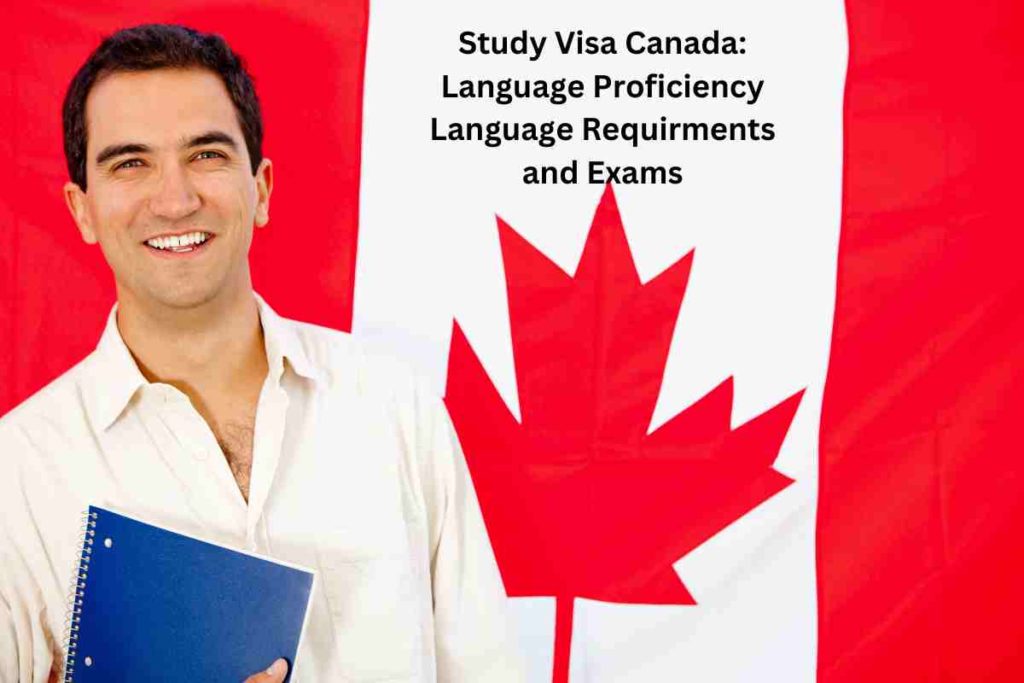Study Visa Canada: Language Proficiency Language Requirments and Exams

Study Visa Canada: Language Proficiency Language Requirments and Exams: Canada, globally recognized for its outstanding educational institutions and diverse cultural environment, has long been a sought-after destination for international students. Every year, thousands of students from around the world aspire to pursue their educational goals in this nation. However, to ensure that these students can cope with the academic demands and integrate well into Canadian society, the Canadian government has instituted certain language proficiency requirements.
For many, understanding these requirements and the associated exams is the first step toward realizing their dream of studying in Canada. This article delves deep into the language proficiency requirements for a Canadian study visa and the different exams that one might need to take to fulfil them.
Overview of Canada’s Study Visa Language Proficiency Requirements
Imagine you’re preparing to run a marathon in a foreign land, and you’ve been training extensively for the climatic conditions, the route, and the competition. Similarly, preparing for language proficiency for Canada’s study visa is no less than training for that marathon. Why is it so crucial? Canada, a bilingual nation with English and French as its official languages, emphasizes language skills to ensure international students can thrive academically and socially.
Understanding Language Proficiency for Canada’s Study Visa
Does the thought of pursuing higher education in Canada excite you? If yes, it’s essential to understand that language proficiency isn’t just about passing a test; it’s about effectively communicating, understanding lectures, participating in group discussions, and integrating seamlessly into Canadian society.
English Language Testing Systems for Canadian Study Visa
Navigating through the maze of English language tests can be overwhelming. But fret not! We’ve got you covered. Let’s break it down:
- IELTS: International English Language Testing System The most widely recognized test worldwide, IELTS evaluates four core language skills: listening, reading, writing, and speaking. The question here is, “Is this test for me?” If you’re aiming for a comprehensive evaluation, then yes!
- TOEFL: Test of English as a Foreign Language Predominantly American-based, TOEFL is a computer-adaptive test. Have you ever wondered how it feels to speak to a computer? TOEFL offers you just that experience with its unique speaking test format.
- PTE: Pearson Test of English Are you looking for quick results? PTE might be your best bet. This computer-based test offers results within five days, making it a popular choice for last-minute applicants.
- CAEL: Canadian Academic English Language Assessment Tailored specifically for Canadian institutions, CAEL assesses language skills in an academic context. Remember, CAEL is the way to go if you’re looking for a test with a Canadian touch!
French Language Testing Systems for Canadian Study Visa
Pourquoi le français? (Why French?) Being one of the two official languages, proficiency in French can open doors to institutions in Québec and other French-speaking regions. Let’s explore:
- TEF: Test d’Évaluation de Français Widely accepted by Canadian institutions, TEF is a direct measure of your French language skills, from listening to writing. It’s time to channel your inner Francophile!
- TCF: Test de connaissance du français Do you thrive under pressure? TCF’s timed sections might be just the challenge you’re looking for. Dive deep into the realms of the French language and culture with this test.
Score Requirements for Various Programs and Institutions
Just as every marathon has its qualifying time, each institution and program in Canada has specific language score requirements. Generally, postgraduate programs demand higher scores than undergraduate ones. Moreover, elite institutions might have stringent criteria. The golden rule? Always check the specific requirements of your chosen institution and program!
Tips to Prepare and Ace These Exams
Think of these exams as a ticket to your Canadian dream. Preparation is key! From practice tests to group discussions, the road to acing these exams involves consistent efforts, understanding the format, and practising under timed conditions.
Alternative Pathways: English/French Immersion Programs
Didn’t you cut the language tests? Don’t lose heart! Canada offers immersion programs that elevate your language skills while granting you provisional admission. Think of it as a bridge to your Canadian educational journey.
Effect of Language Scores on Visa Approval Rates
Can a high language score boost your visa approval chances? Absolutely! A high score reflects your language proficiency and your commitment and preparedness for academic life in Canada.
Differences Between Language Requirements for Undergraduate and Postgraduate Programs
While undergraduate programs might be more lenient, postgraduate courses, especially research-based ones, demand higher language proficiency. Why? The emphasis on presentations, thesis writing, and group discussions requires advanced language skills.
Provincial Differences in Language Requirements
Like every state’s flavour, each Canadian province has specific language requirements based on its demographics and official language(s). Québec, for instance, leans heavily towards French.
Common Challenges Faced by International Students
The Canadian classroom can pose unique challenges, from grappling with accents to understanding everyday phrases. But remember, every challenge is an opportunity in disguise to immerse and integrate!
Impact of Online Classes on Language Proficiency Requirements
Has the rise of online education affected language requirements? Surprisingly, they remain essentially unchanged. However, the testing mode has evolved, with many exams now being offered online.
Benefits of High Language Scores
Beyond visa approvals, a high language score can lead to scholarships, research opportunities, and internships. It’s like having an ace up your sleeve!
Understanding Exemptions and Exceptions
Certain situations or backgrounds might exempt you from taking these tests. For instance, if you’ve completed an entire program in English, some institutions might waive the language requirement.
Role of Consultancies and Immigration Lawyers
Embarking on this journey alone can be daunting. Consultancies and immigration lawyers can provide expert guidance, helping you navigate the application process seamlessly.
Frequently Updated Resources for Exam Preparation
The internet is awash with resources. From official test websites to forums, staying updated with the latest materials and formats can give you an edge.
Exam Retakes: What Should You Know?
Didn’t get the desired score? You can retake the exams. However, it’s essential to understand the waiting period and how often you can attempt.
Preparing for the Speaking Section: Practical Tips
The speaking section can be tricky. But with mock interviews, understanding common topics, and practising fluency, you can ace it!
Reading and Listening Sections: Strategies for Success
Skimming, scanning, and understanding context can be game-changers for these sections. Remember, it’s not just about comprehension but also speed.
How Cultural Understanding Elevates Language Proficiency
Language isn’t just words. It’s culture, emotions, and expressions. Understanding Canadian culture can elevate your language proficiency to new heights.
Avoiding Common Mistakes in the Application Process
From submitting scores on time to understanding the validity of tests, avoiding common pitfalls can streamline your application process.
The Future of Language Proficiency Requirements for Canada
How will Canada’s language requirements change with globalization and evolving educational landscapes? While it’s hard to predict, staying informed is the key!
How COVID-19 Affected the Language Test Scene
The pandemic disrupted everything, including language tests. With test centres closing down, online testing became the new norm.
Online Versus Offline Exams: Pros and Cons
While online exams offer convenience, offline ones provide a traditional setting. Both come with their set of advantages and challenges.
Conclusion: Study Visa Canada: Language Proficiency Language Requirments and Exams
In conclusion, understanding and meeting the language proficiency requirements is a pivotal step for any international student hoping to study in Canada. Not only does it ensure that students can effectively communicate and succeed in their chosen academic fields, but it also plays a crucial role in their smooth integration into the Canadian academic and social fabric.
Therefore, it’s paramount for aspiring students to familiarize themselves with the various exams and requirements associated with the Canadian study visa. By doing so, they can not only increase their chances of visa approval but also set themselves up for a fulfilling educational experience in Canada.
FAQ Answers: Study Visa Canada: Language Proficiency Language Requirments and Exams
- What is the minimum language score needed for Canada Study Visa? The minimum score varies based on the institution and program. However, a general benchmark for undergraduate programs is 6.0 for IELTS and 80 for TOEFL iBT.
- Are there alternative pathways if I don’t meet the required scores? Yes! Many institutions offer language immersion programs or foundation courses to help bridge the gap.
- How often can I retake these language exams? Most exams allow retakes, but checking the specific waiting period is advisable.
- Is there a difference in language requirements between universities and colleges? Generally, universities have stricter requirements than colleges, especially for postgraduate programs.
- How do online classes affect language proficiency requirements? While the mode of types has shifted online, language requirements remain broadly consistent.
- Can I provide results from more than one language test? Yes, as long as the institution accepts both tests and they are valid.
- What are the costs associated with these language exams? Prices vary based on the location and exam. IELTS, for instance, might range between $215 to $250.
- Is a high language score a guarantee for visa approval? While it boosts chances, visa approval depends on various factors, including financial stability and the overall application.
- What is the validity period of these language tests? Typically, most tests like IELTS and TOEFL are valid for two years.
- Are there institutions that do not require language proficiency tests? A few institutions might waive the requirement based on specific criteria, like completing a prior degree in English.
- Why are language proficiency tests required for Canadian institutions? These tests ensure that international students can effectively communicate and comprehend course materials, ensuring their academic success.
- Can I study in Canada without taking a language proficiency test? Some institutions might offer exemptions based on specific criteria, like completing a prior degree in English. However, most universities and colleges require it.
- What’s the difference between IELTS Academic and IELTS General Training? IELTS Academic is tailored for those seeking higher education, while General Training is for work or immigration purposes.
- Do all Canadian universities accept TOEFL scores? Most Canadian universities accept TOEFL, but always verify with the specific institution you’re applying to.
- If I’ve lived in an English-speaking country for several years, do I still need to take the test? Some universities might waive the test requirement in this case, but others might still require formal proof.
- How do I send my test scores to universities or colleges? Most testing bodies allow you to send your scores directly to institutions, either electronically or via post.
- Can I mix scores from different test sittings? No, institutions generally require scores from a single test session.
- What should I do if my test scores expire before my application process is complete? You’ll likely need to retake the test. Most scores are valid for two years.
- How long does it take for universities to receive my test scores? It varies but usually takes 2 to 4 weeks.
- Is there an age limit for taking the IELTS or TOEFL? No, there’s no age limit, but they’re designed for adult test-takers.
- How can I find test centres near me? Visit the official website of the exam you intend to take; they often have a test centre locator.
- How do I request accommodations for a disability during the test? Contact the testing body directly; they’ll guide the accommodations process.
- Do Canadian institutions offer any preparatory courses for these language tests? Yes, many institutions and private centres offer introductory courses.
- What happens if I fail the language test? There’s no “pass” or “fail”; however, if you don’t achieve the required score, you can retake the test.
- How does the CAEL test differ from other English proficiency tests? CAEL (Canadian Academic English Language) is tailored for the Canadian academic context, testing English at Canadian universities and colleges.
- Do Canadian institutions widely accept the PTE score? PTE (Pearson Test of English) is gaining acceptance but always check with individual institutions.
- How many times can I retake a language proficiency test? There’s no set limit, but it’s essential to understand the waiting period and associated costs.
- Are there any scholarships available based on my language test scores? Some institutions offer scholarships for high achievers, which might consider language test scores.
- Which regions in Canada primarily require French proficiency? Quebec is the primary province, but some institutions in other areas might also offer courses in French.
- What is the average score requirement for master’s programs in Canada? It varies by institution and schedule, but a higher score is generally expected for postgraduate programs than undergraduate ones.
- Do colleges and vocational schools also require language proficiency tests? Yes, though requirements might be slightly more lenient than universities.
- Can I take the language test after receiving a conditional offer from a university? Some universities offer conditional admissions with the requirement to meet the language proficiency later, typically before the course starts.
- Which test is more straightforward: IELTS, TOEFL, or PTE? “Easier” is subjective. Each test has a different format, and what’s easier for one person might not be for another.
- How are the speaking test interviews conducted for online versions of these exams? Interviews are usually conducted live with an examiner via video call.
- Is there a benefit to taking both an English and a French proficiency test? It might expand your program options in bilingual institutions or regions like Quebec.
- Do Canadian universities offer English/French language courses alongside degree programs? Yes, many institutions provide language immersion or foundation programs to support international students.
- How much time should I allocate for test preparation? It varies per individual, but typically 2-3 months of dedicated practice is advised.
- Are there free resources available online for test preparation? Yes, many official test websites, forums, and educational platforms offer free materials and mock tests.
- Can I get a refund if I cancel my test appointment? Refund policies differ by testing body. Usually, there’s a cancellation fee.
- What identification documents do I need on the test day? Typically, a valid passport or national ID card is required.
- How do Canadian language proficiency requirements compare with countries like the USA, UK, or Australia? Each country has its benchmarks. Canadian requirements generally align with these countries, but always check specific institutions.
- Are there any changes to the test format or scoring system in recent years? Test formats remain relatively consistent, but it’s always good to check the official website for the most recent updates.
- How soon should I book a test date before my university application deadline? Ideally, 3-4 months advance to ensure scores arrive on time.
- Given the current global situation, what safety measures are in place for offline tests? Testing centres have implemented reduced capacity, sanitization, and mandatory masks.
-
Can I use my language test scores for other purposes, like immigration or job applications in Canada? Yes, many immigration pathways and employers recognize these test scores.







